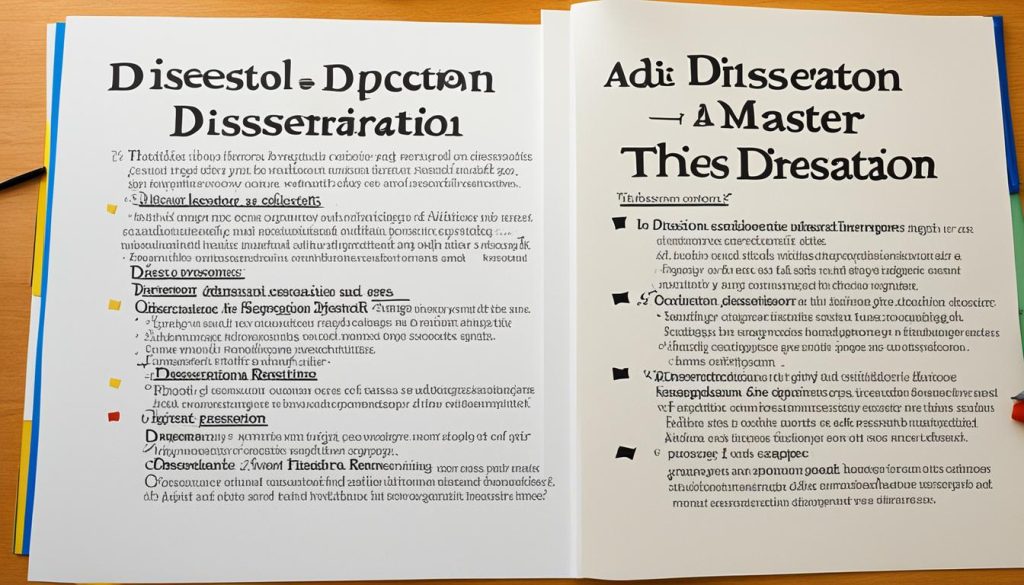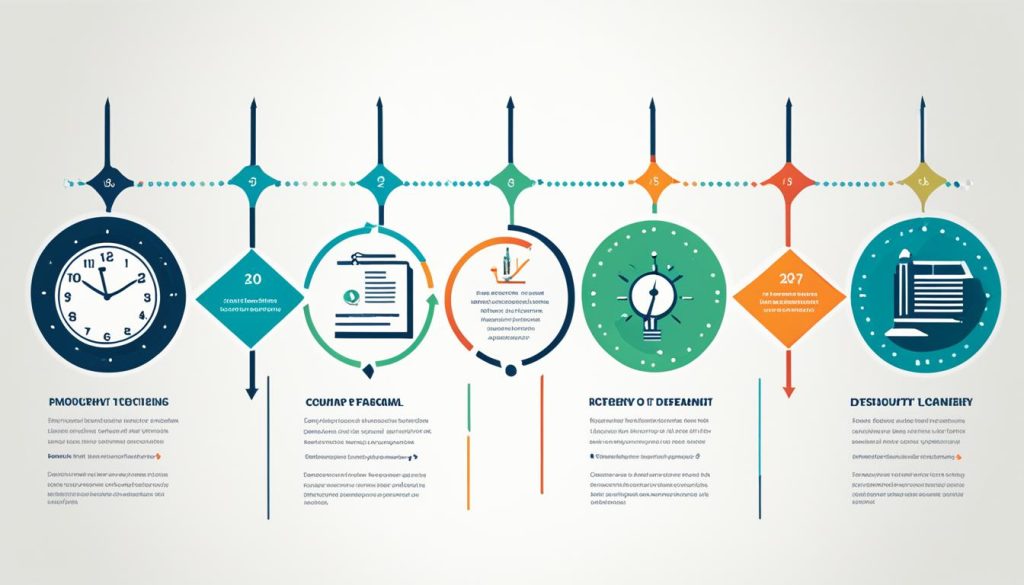The journey to completing a doctoral degree often involves the completion of a dissertation or thesis. However, it is important to understand the nuances of this requirement and whether it is mandatory for all doctoral programs. Let’s explore the requirements for doctoral degrees and the role of dissertations in the process.
Key Takeaways:
- Doctoral degrees often require the completion of a dissertation or thesis.
- Dissertations can be a mandatory requirement in some doctoral programs.
- Understanding the role of dissertations is crucial in approaching doctoral studies.
- Dissertations involve original research, while theses involve the review of existing research.
- Completing a dissertation demonstrates mastery and independent research skills.
Understanding Doctoral Programs and Dissertations
Doctoral programs are highly specialized and rigorous, requiring students to engage in advanced research and study within their chosen field. A key component of many doctoral programs is the completion of a dissertation or thesis. While the terms “dissertation” and “thesis” are often used interchangeably, there are distinctions between the two. A dissertation typically involves original research, while a thesis is a comprehensive review of existing research. However, it is important to note that the requirement for a dissertation varies among different doctoral programs.
“Doctoral programs equip students with the knowledge and skills necessary to become experts in their field.”
Doctoral programs are designed to equip students with the knowledge and skills necessary to become experts in their field. These programs provide students with opportunities to delve into advanced research topics and contribute new insights to their disciplines. The completion of a dissertation or thesis is a significant part of this process.
**Doctoral programs** offer students the chance to specialize in their area of interest and pursue in-depth research. **Dissertations** are often the culmination of these research efforts, allowing students to showcase their expertise and contribute to the existing body of knowledge. The role of dissertations in doctoral studies is critical, as they enable students to apply rigorous research methodologies, analyze data, and present original findings.
Advancing Knowledge through Dissertations
“Dissertations are instrumental in advancing knowledge and pushing the boundaries of academic research.”
Dissertations play a significant role in advancing knowledge and pushing the boundaries of academic research. Through the process of conducting original research, doctoral students explore new theories, methodologies, and perspectives within their field. The findings from dissertations contribute to the ongoing discourse and serve as a foundation for future research endeavors.
In contrast, **theses** often focus on synthesizing and analyzing existing research to provide a comprehensive understanding of a particular topic. Theses demonstrate a student’s mastery of the subject matter and their ability to critically evaluate existing literature.
The Distinction Between Dissertations and Theses
The distinction between **doctoral dissertations and master’s theses** lies in the depth of research and originality required. Doctoral dissertations typically demand a higher level of scholarship and involve conducting independent research, whereas master’s theses primarily involve synthesizing existing research. *Doctoral programs* place a greater emphasis on producing original research that adds to the body of knowledge in the field.
It is important to remember that the specific requirements for dissertations and theses may vary depending on the institution and program. However, the underlying goal remains the same: to contribute to the academic community by exploring new ideas, challenging existing theories, and presenting well-researched arguments.
| Doctoral Dissertations | Master’s Theses |
|---|---|
| Involve original research | Synthesize existing research |
| Contribute to the field’s body of knowledge | Showcase mastery of subject matter |
| More rigorous research requirements | Less extensive research requirements |
The table above summarizes the key differences between doctoral dissertations and master’s theses. Doctoral dissertations involve original research, contribute to the field’s body of knowledge, and have more rigorous research requirements. Meanwhile, master’s theses focus on synthesizing existing research and showcase a student’s mastery of the subject matter.
By understanding the significance of dissertations in doctoral studies and the distinction between dissertations and theses, students can approach their doctoral journey with clarity and purpose.
The Dissertation Journey: A Step-by-Step Process
The process of completing a dissertation can be complex and challenging. It requires careful planning, extensive research, and meticulous analysis. To assist students on this journey, Walden University, a renowned provider of doctoral research degrees, has developed a comprehensive guidebook that outlines the step-by-step process of completing a dissertation.
The Walden University’s Dissertation Guidebook provides invaluable support and guidance to students as they navigate through each stage of the dissertation process. By following this guidebook, students can effectively manage their time and resources, making the dissertation process more efficient and successful.
The key steps highlighted in Walden University’s dissertation guidebook include:
- Developing a dissertation premise: This step involves formulating a clear and concise research focus, identifying the research problem, and establishing the significance of the study.
- Forming a committee: Students are encouraged to form a committee of faculty members who will provide guidance and support throughout the dissertation process.
- Creating a prospectus: The prospectus outlines the research plan, including the research questions, methodology, and expected outcomes.
- Conducting research: This step involves systematic data collection, analysis, and interpretation to address the research questions and contribute to the existing body of knowledge.
- Analyzing data: The collected data is meticulously analyzed using appropriate statistical or qualitative analysis techniques to draw meaningful conclusions.
- Writing the final dissertation: This is the culminating step where students synthesize their findings, present their research in a structured manner, and produce a well-written dissertation that aligns with academic standards.
By following these steps, students can navigate through the dissertation process with confidence, ensuring that they complete a high-quality and impactful dissertation. Walden University’s dissertation guidebook serves as a roadmap, providing students with the necessary tools and resources to successfully complete their dissertations.

Doctoral Dissertation vs Master’s Thesis: Key Differences
When comparing doctoral dissertations and master’s theses, it is essential to understand the key differences between these two academic projects. While both require extensive research, they differ in various aspects, including the nature of research and the complexity of the projects.
Doctoral dissertations typically involve **original research** conducted by the student, contributing new knowledge to the academic field. On the other hand, master’s theses focus on **synthesizing existing research** and analyzing it from a comprehensive standpoint.
“Doctoral dissertations require more rigorous research requirements, including conducting original experiments and studies,” says Dr. Emily Johnson, a professor of academia at Stanford University. “Conversely, master’s theses involve a more in-depth analysis of existing research literature.”
In terms of length and complexity, **dissertations are typically longer and more comprehensive** compared to master’s theses. This is partly due to the exhaustive original research that doctoral students are expected to conduct. However, the specific length and complexity can vary depending on the institution and program requirements.
“The key difference lies in the level of depth and the contribution to the field,” explains Dr. Thomas Anderson, Dean of the Graduate School at Harvard University. “Doctoral dissertations aim to advance knowledge through original research, while master’s theses focus on demonstrating the student’s ability to apply existing research in a comprehensive manner.”
The review and approval process for dissertations is often more challenging compared to master’s theses. While both undergo evaluation by an academic committee, **dissertations may involve external experts** in the field who provide additional scrutiny. Doctoral students may also be required to defend their research through an **oral defense**, where they present their findings to the committee and engage in a thorough discussion.
Below is a comparison table highlighting the key differences between doctoral dissertations and master’s theses:
| Doctoral Dissertations | Master’s Theses |
|---|---|
|
|
Understanding these differences is crucial for students considering pursuing doctoral or master’s degrees. By recognizing the unique demands of each, students can make informed decisions about their academic journey and choose the path that best aligns with their research interests and career goals.

The Role of Research Objectives in Dissertations and Theses
Research objectives are a fundamental component of both doctoral dissertations and master’s theses. They provide a clear direction and purpose for the research project, guiding the entire process of investigation and analysis. In this section, we will delve into the significance of research objectives and how they are formulated in dissertations and theses.
Formulation of Research Objectives
When formulating research objectives in a master’s thesis, the focus is on addressing specific research questions within the chosen topic. By setting clear and concise objectives, the researcher can deepen their understanding of existing theories within the field of study and contribute to the body of knowledge. These objectives shape the research methodology, guiding the researcher’s approach to data collection, analysis, and interpretation.
On the other hand, doctoral dissertations require broader and more ambitious research objectives. The formulation of research objectives for doctoral dissertations aims to address complex research gaps, propose new theories, and make significant contributions to the academic field. These objectives often involve multiple research questions and require interdisciplinary thinking, leading to the development of innovative solutions and ideas.
The Significance of Research Objectives
The formulation of research objectives in both dissertations and theses serves several important purposes. Firstly, research objectives define the scope of the study, ensuring that the research remains focused and relevant to the overall research question. They also help establish criteria for evaluating the success of the research project, enabling the researcher to assess whether the objectives have been achieved.
Additionally, research objectives provide a roadmap for the research process, helping the researcher stay on track and make efficient use of their time and resources. By outlining specific goals and outcomes, research objectives prevent the study from becoming overly vague or exploratory, ensuring the research remains purposeful and systematic.
“Research objectives guide the entire research project and help achieve specific goals in both dissertations and theses.”
An Example of Research Objectives in a Dissertation
Let’s consider an example in the field of psychology. A doctoral dissertation on the effects of mindfulness techniques on stress reduction may have the following research objectives:
- To explore the existing literature on mindfulness and stress reduction.
- To investigate the impact of mindfulness techniques on physiological markers of stress.
- To examine the psychological mechanisms underlying the effectiveness of mindfulness in stress reduction.
- To assess the long-term effects of mindfulness techniques on overall well-being and quality of life.
These research objectives provide a clear framework for the study, guiding the researcher’s efforts in conducting a comprehensive investigation into the topic. Each objective represents a specific aspect of the research project, contributing to the overall goal of understanding the relationship between mindfulness and stress reduction.
Integrating research objectives into your dissertation or thesis not only adds structure and purpose to your study, but also positions your research within the broader academic context. By formulating clear and achievable objectives, you can create a solid foundation for your research, leading to meaningful insights and contributions to your field of study.

| Dissertations | Theses |
|---|---|
| Address complex research gaps | Address specific research questions |
| Propose new theories | Deepen understanding of existing theories |
| Contribute to the academic field | Contribute to the existing body of knowledge |
Timeframe for Completing a Dissertation or Thesis
One of the key considerations for students embarking on doctoral programs is the time required to complete a dissertation or thesis. The duration of these academic projects can vary depending on several factors.
When it comes to master’s theses, it typically takes a couple of semesters or 1-2 years to complete the research and writing process. This timeframe allows students to delve into their chosen topic, conduct the necessary research, and develop a comprehensive thesis.
On the other hand, completing a doctoral dissertation is a more time-consuming endeavor. Doctoral programs require a deeper level of research and analysis, often taking 4-7 years to complete the entire process. The additional time is necessary to explore complex research questions, contribute to existing academic literature, and demonstrate a mastery of the subject matter.
It’s important to note that the duration of doctoral programs itself can impact the time needed to complete the dissertation or thesis. Some programs have a set timeline, while others allow for more flexibility. Students should consider these program-specific factors when planning their research and setting realistic expectations for completion.
Aside from program duration, there are additional factors that can influence the timeframe for completing a dissertation or thesis. The complexity of the subject matter, availability of resources, and individual work pace are all variables that can impact the time needed to conduct thorough research, analyze data, and craft a compelling final document.
Ultimately, the completion of a dissertation or thesis is a significant milestone in a student’s academic journey. While the process may require a considerable investment of time and effort, it is a valuable opportunity for students to contribute to their respective fields and develop expertise in their chosen area of study.

| Type of Academic Project | Timeframe |
|---|---|
| Master’s Thesis | A couple of semesters or 1-2 years |
| Doctoral Dissertation | 4-7 years |
The Review and Approval Process for Dissertations and Theses
The review and approval process for dissertations and theses are critical stages in the completion of these academic projects. While the overall process is similar for both, dissertations often undergo a more rigorous scrutiny, ensuring their high academic standards.
In the case of master’s theses, the evaluation typically takes place within the university department, conducted by a committee composed of faculty members. The committee carefully reviews the content, methodology, and presentation of the thesis.
“The review committee plays a significant role in providing valuable feedback and suggestions, guiding students towards creating a well-rounded and impactful thesis.”
For doctoral dissertations, the review process involves experts in the field, both from within the university and external reviewers. This ensures that the research is evaluated by scholars who are knowledgeable in the specific subject area. The external reviewers provide an unbiased perspective on the quality and contribution of the dissertation to the academic field.
The Approval Process
Once the review process is complete, the committee or the external reviewers provide feedback and recommendations to the student. The student then incorporates the suggested revisions and improvements into their dissertation or thesis.
The final step in the approval process is often an oral defense, which is typically required for doctoral dissertations. During the defense, the student presents their research, findings, and methodology to the committee and a broader audience. They defend their work against questions and critiques from the committee members, demonstrating their in-depth understanding of the subject matter and the validity of their research.

This image illustrates the importance of the oral defense in the approval process for doctoral dissertations. It represents a significant moment when students showcase their research achievements and communicate the significance of their findings.
Overall, the review and approval process for dissertations and theses ensures that the academic community upholds the highest standards of research and scholarship. It provides a platform for rigorous evaluation, constructive feedback, and the opportunity to make meaningful contributions to the chosen field of study.
Conclusion
Completing a doctoral degree is a remarkable accomplishment that requires dedication and perseverance. The significance of dissertations and theses in this journey cannot be overstated. These culminating projects not only demonstrate a student’s mastery of the subject matter but also showcase their ability to conduct independent research.
While there may be variances between dissertations and theses, both contribute significantly to the advancement of knowledge within their respective fields. Through the rigorous process of completing a dissertation or thesis, students become experts in their chosen area of study and make valuable contributions to the academic community.
By thoroughly understanding the requirements and process involved in completing a dissertation or thesis, students can navigate their doctoral journey with confidence. These projects serve as milestones that not only mark the successful completion of a doctoral degree but also pave the way for future research and professional opportunities. As students embark on this challenging yet rewarding endeavor, they have the potential to influence and shape their academic field, leaving a lasting impact on the world of knowledge.




No comments! Be the first commenter?